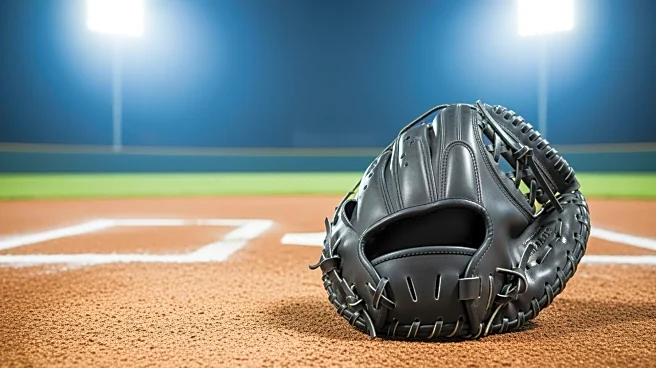What's Happening?
The Gold Glove Awards, recognizing the best defensive players in Major League Baseball, were announced recently. Despite strong defensive metrics, Toronto Blue Jays' catcher Alejandro Kirk did not win
the award. Kirk, who had a Fielding Run Value of 22, was surpassed by Dillon Dingler of the Detroit Tigers, who had a Fielding Run Value of 12. Kirk excelled in framing and blocking, outperforming Dingler in these areas. However, Dingler had a slight edge in throwing run value. Additionally, Ernie Clement, another Blue Jays player, was nominated for two Gold Gloves but did not win in either category. Ty France, who joined the Blue Jays from the Minnesota Twins, was the only player from the team to secure a Gold Glove, winning at first base.
Why It's Important?
The outcome of the Gold Glove voting highlights the ongoing debate in baseball between traditional perceptions and advanced metrics. Kirk's exclusion, despite superior defensive statistics, raises questions about the criteria used in award decisions. This situation underscores the challenges players face in gaining recognition purely based on analytical performance. For the Blue Jays, this could impact team morale and influence future decisions regarding player development and recognition. The awards also affect players' market value and contract negotiations, making them significant beyond mere accolades.
What's Next?
The results may prompt discussions within the MLB community about the criteria for Gold Glove selections. Teams and players might advocate for a more transparent and metrics-based approach to award voting. For Kirk and Clement, the focus will likely shift to maintaining their performance and proving their defensive prowess in the upcoming season. The Blue Jays might also use this as motivation to enhance their defensive strategies and player training programs.
Beyond the Headlines
This situation reflects broader themes in sports where traditional views often clash with data-driven insights. The reliance on advanced metrics in player evaluation is growing, yet recognition systems like awards may lag in adapting to these changes. This could lead to a reevaluation of how achievements are measured and rewarded in professional sports, potentially influencing other leagues and sports as well.










